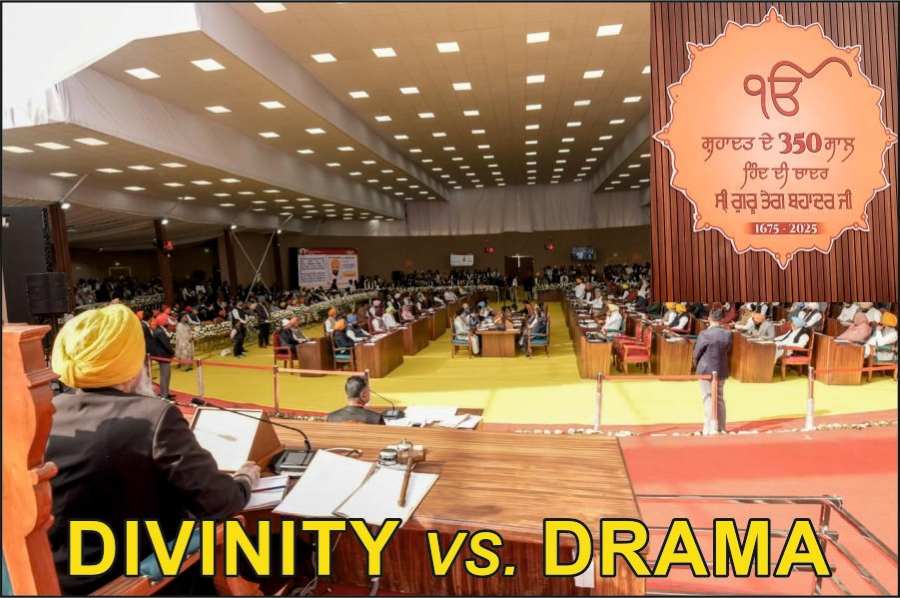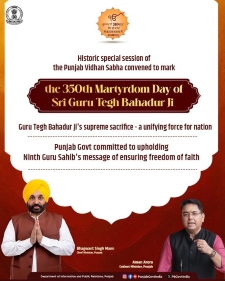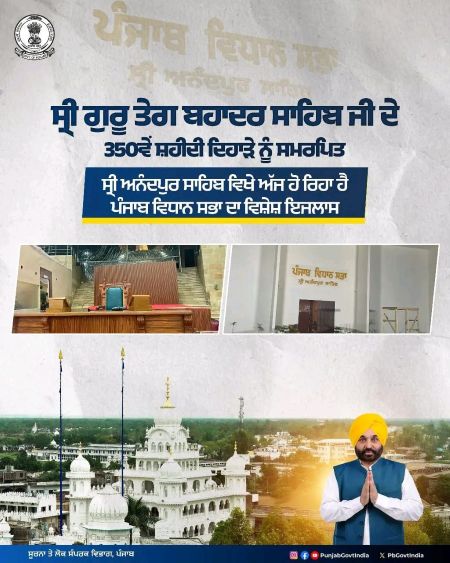Guru Tegh Bahadur was honoured in rhetoric, while AAP’s top leadership was marketed in visuals
ALL OF HUMANITY bows to the supreme martyrdom of Guru Tegh Bahadur Sahib — the defender of conscience, the guardian of another’s faith. His sacrifice, offered not for his own creed but for another’s right to worship freely, remains one of the most luminous acts of courage in human history. On the 350th anniversary of his martyrdom, his memory commands universal reverence.
ਤਿਲਕ ਜੰਵੂ ਰਾਖਾ ਪ੍ਰਭ ਤਾ ਕਾ ॥
ਕੀਨੋ ਬਡੋ ਕਲੂ ਮਹਿ ਸਾਕਾ ॥
ਸਾਧਨ ਹੇਤਿ ਇਤੀ ਜਿਨਿ ਕਰੀ ॥
ਸੀਸੁ ਦੀਆ ਪਰ ਸੀ ਨ ਉਚਰੀ ॥੧੩॥
ਧਰਮ ਹੇਤਿ ਸਾਕਾ ਜਿਨਿ ਕੀਆ ॥
ਸੀਸੁ ਦੀਆ ਪਰ ਸਿਰਰੁ ਨ ਦੀਆ ॥
These immortal lines capture the grandeur of his sacrifice — He gave his head, but never allowed righteousness itself to bow.
And it is precisely because his sacrifice is so sacred that what unfolded at Anandpur Sahib demands scrutiny.
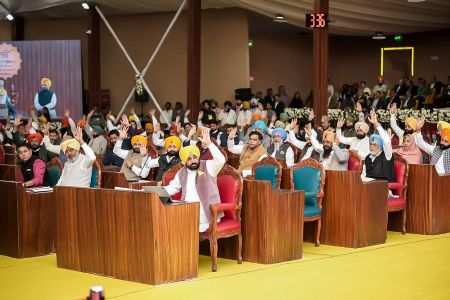
Punjab Vidhan Sabha special session held at Anandpur Sahib.
The Punjab government staged a one-day pageant of piety at Anandpur Sahib and called it a “special session” of the Vidhan Sabha.
What took place was largely symbolic theatre dressed up as legislative business — a resolution to tag Anandpur Sahib, Talwandi Sabo and parts of Amritsar as “holy cities,” ritual observances, and carefully crafted optics. The form and mechanics of the event raise sharper questions than the words in the resolution answer.
Why It Was Held, Why There, and What It Achieved
Officially, the session was tied to the 350th martyrdom anniversary of Guru Tegh Bahadur and presented as a tribute to Sikh history and values.
But the timing, the staging outside Chandigarh for the first time ever, and the content (a purely declaratory resolution) reveal the political subtext: spectacle to consolidate cultural identity in advance of political battles and to create a news cycle dominated by government ritual rather than governance.
The Assembly itself moved only symbolic resolutions that needed no special house at a sacred shrine to be tabled.
Declaring holy-city status, banning sale/consumption of liquor/meat/tobacco in designated zones and passing homage resolutions are politically resonant moves — they speak to identity, vote-banks, and cultural pride.
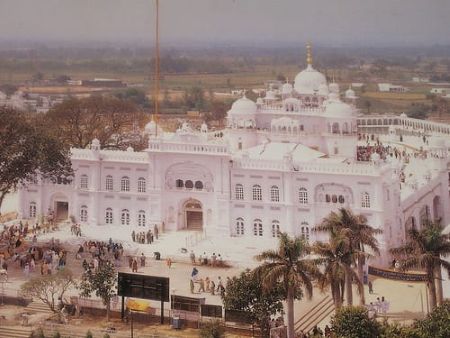
Keshgarh Sahib, Anandpur Sahib — the birthplace of the Khalsa.
But they are administrative and executive in nature (orders, notifications, enforcement rules) rather than matters that required the legislature to convene in a tented park. In short: significance in optics; minimal significance in institutional substance.
If the sole purpose was to honour a historical occasion, a commemorative function would have sufficed. If the purpose was to underscore the Government’s closeness to religious sentiment, then the venue worked as theatre.
If the purpose was to legislate or pass urgent, technical orders, then using a special session outside the capital was unnecessary and performative.
The legislative business conducted could have been carried out in Chandigarh and then memorialised with events in Anandpur Sahib — reversing that sequence risks turning the legislature into an instrument of spectacle.
What the house achieved immediately was a unanimous, emotive resolution and a suite of public-relations headlines: “holy cities,” “inspired by Guru Tegh Bahadur,” and images of the Chief Minister taking vows before a sacred congregation.
Substantively, no regulatory framework, enforcement plan, or budgetary provision was announced on the floor that would make these declarations durable policy. In other words: announcements, not administrative instruments.
And if the government was truly serious about honouring the spirit of the Gurus, it would have declared these towns Punjab’s cleanest, best-governed, corruption-free heritage cities — a tribute rooted in service, not symbolism. A clean, functional, well-preserved Anandpur Sahib would be a better homage than any proclamation delivered in a makeshift Vidhan Sabha house.
What Could Have Been Done in Chandigarh, and the Question of Waste
Every resolution, motion and subsequent government notification could have been tabled and debated in the Vidhan Sabha complex in Chandigarh. Laws and administrative bans do not gain legal potency because a prayer carpet replaced the Speaker’s chair for a day.
Instead of demonstrating the legislature’s functional independence, this stunt sent the opposite message: the legislature can be taken on tour to fit a political photo-op.
The special-session format imposed real costs: logistics, tented infrastructure, transport for MLAs, security, extensive police deployment and the administrative overhead of running a temporary assembly.
Punjab Police and other agencies deployed thousands of personnel, sector control rooms, drones, ANPR surveillance and tent cities to host devotees and VIPs.
That is not inexpensive. If taxpayers are to underwrite such spectacles, the government must publish an itemised account: total cost, procurement details, hospitality expenditures, and any overtime/contingency payouts. Absent that transparency, calls of waste are reasonable.
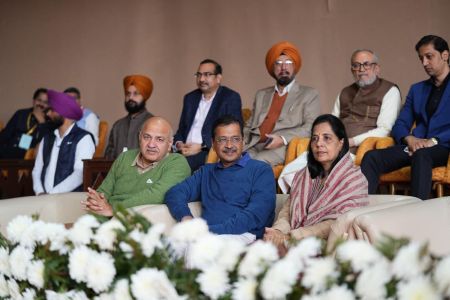
Manish Sisodia, Mrs Kejriwal and Arvind Kejriwal at the Anandpur Sahib special session
Reports and official briefings show massive security fencing, 25 sector divisions, thousands of police personnel and high-tech surveillance to manage movement and protect VIPs. Large tent-cities were set up to “facilitate devotees,” but the scene also meant heavy policing, controlled access and restrictions that altered pilgrims’ routines.
When ritual and VIP protection override ordinary citizens’ freedom of movement and local businesses’ normal functioning, the state needs to account for whom it served. Was this primarily for the people — or for a photo-finish of power?
Respect Faith but Avoid Stunts
There is nothing wrong in honouring Guru Tegh Bahadur or celebrating Sikh heritage. But the government converted a solemn occasion into a party-centric PR spectacle. The backdrop, the stagecraft, the coordinated visuals — all prominently highlighted Arvind Kejriwal and Manish Sisodia.
In what capacity?
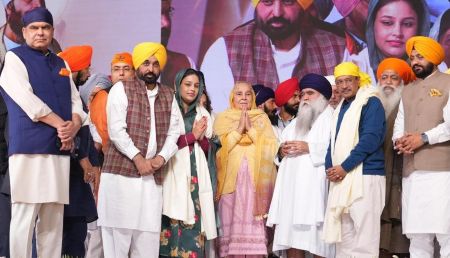
Arvind Kejriwal felicitated during the special function marking Guru Tegh Bahadur’s Martyrdom Day at Anandpur Sahib.
Neither is a member of the Punjab Assembly. Neither holds any constitutional office relevant to Punjab’s legislature. Their presence — and, more importantly, their deliberate projection — made it clear that this was less a state ceremony and more an AAP branding exercise.
The pious occasion was reduced to a stage prop for the Delhi leadership’s visibility.
Respect faith, yes. But faith should not be used as a backdrop for political marketing.
Blurred Boundaries, Unstated Motives, and Local Disillusionment
A democratically elected government may celebrate religious history; it must not use public funds to favour or stage religious spectacles that double as political theatre. There is a constitutional and ethical boundary between honoring faith and instrumentalising it for partisan advantage.
When a legislative assembly meets in a sacred venue to pass symbolic resolutions timed for high-media visibility, that boundary becomes worryingly porous.
Governments habitually court cultural and religious symbols to consolidate electoral support.
The Anandpur Sahib session’s timing, the presence of top leaders, and the content of resolutions — identity-affirming and culturally loaded — are textbook moves in electoral politics: appeal to emotion, claim cultural guardianship, create the narrative of being the “protector” of tradition. That calculus does not invalidate genuine reverence, but it does demand suspicion and scrutiny.
Notably, local reporting shows that many residents of Anandpur Sahib felt underwhelmed by “holy city” declarations, treating them as slogans that do not fix civic problems — sanitation, heritage conservation, livelihoods or meaningful legal safeguards.
Declarations without follow-through on ground realities are hollow. If the government truly cared for these towns, it would announce concrete development, preservation and enforcement measures alongside any symbolic status.
The Public Deserves Transparency and Accountability
If a government chooses symbolism over substance, the least it owes its citizens is complete transparency. A spectacle of this scale — relocated legislature, elaborate tents, massive policing, VIP-centric arrangements, and heavy expenditure — cannot remain wrapped in ambiguity.

People deserve to know what it cost, who authorised what, why certain political faces were showcased, and what tangible outcomes justify the expense. Without answers, the entire exercise stands exposed as a taxpayer-funded political event rather than a constitutional one.
1. Publish the full cost-breakup of the special session (venue, travel, tents, security, hospitality, equipment).
2. Share minutes and the legal roadmap for implementing “holy city” bans — with enforcement authorities and budgets.
3. Explain why the Assembly needed relocation for symbolic business that could be done in Chandigarh.
4. Commit to measurable development, not ceremonial gestures, for Anandpur Sahib, Talwandi Sabo and Amritsar Sahib’s walled city.
Final word — respect faith; respect institutions more
There is nothing inherently wrong with honouring history, faith and martyrs. But when honouring becomes a substitute for governing — when the legislative chamber is reduced to a platform for pageantry, when public money and police power are marshalled mainly for optics — citizens must call the government to account. Worship the past, yes. But do not hollow out democratic institutions in the process. ![]()
_________
Also Read:
Guru Tegh Bahadur: The Martyr Who Defended Freedom of Conscience
Disclaimer : PunjabTodayNews.com and other platforms of the Punjab Today group strive to include views and opinions from across the entire spectrum, but by no means do we agree with everything we publish. Our efforts and editorial choices consistently underscore our authors’ right to the freedom of speech. However, it should be clear to all readers that individual authors are responsible for the information, ideas or opinions in their articles, and very often, these do not reflect the views of PunjabTodayNews.com or other platforms of the group. Punjab Today does not assume any responsibility or liability for the views of authors whose work appears here.
Punjab Today believes in serious, engaging, narrative journalism at a time when mainstream media houses seem to have given up on long-form writing and news television has blurred or altogether erased the lines between news and slapstick entertainment. We at Punjab Today believe that readers such as yourself appreciate cerebral journalism, and would like you to hold us against the best international industry standards. Brickbats are welcome even more than bouquets, though an occasional pat on the back is always encouraging. Good journalism can be a lifeline in these uncertain times worldwide. You can support us in myriad ways. To begin with, by spreading word about us and forwarding this reportage. Stay engaged.
— Team PT
